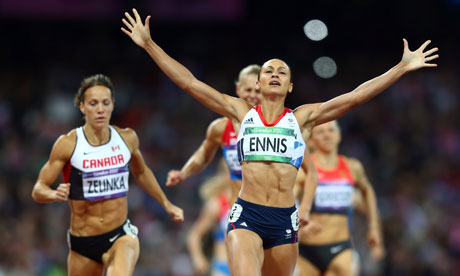
Jessica Ennis crosses the finish line in the 800m to take gold in the women's heptathlon. Photograph: Michael Steele/Getty Images
Whatever they decide to do with the Olympic Stadium, whether they downsize it or demolish it, keep it for athletics or make a deal with the great god football, this is a corner of east London that will for ever be associated with Jessica Ennis and the two days over which she won the 2012 heptathlon.
Taking an overnight lead into the second day after four of the event's seven disciplines, the 26-year-old from Sheffield came safely through the long jump, produced a personal best in the javelin, and finished by winning the 800m in a time of 2min 8.65sec. Her total of 6,955 points was the third highest in the history of the Olympic competition, first held in 1984.
This is a nation that adores its all-rounders of track and field, its Mary Rands and Daley Thompsons, and it has loved Ennis since first clapping eyes on her. Such a little thing, yet such talent, such courage, such determination to conquer her weak points: the love positively rained down on her as she completed the task with a flourish.
Maybe that is why we love them so much. We know that Usain Bolt was born to sprint, that Steve Backley was born to throw a javelin and that Bob Beamon was born to leap. But no one can be equally brilliant at all the disciplines, so the test for competitors in the combined events necessarily arises from the way they cope with their limitations. Somehow that makes them a little more like the rest of us and even more extraordinary than the specialists.
Athletes often talk about going out and making a statement. Ennis had said her piece a few minutes past 10am on Friday, when she completed her first event, the 100m hurdles. Glowing with fitness as she acknowledged the crowd's welcome in the sunshine, yet wearing an expression that unmistakably betrayed an awareness of the strains and tensions to come, she seemed to glisten as she flew over the 10 flights like a swallow skimming a lake in high summer.
It took her 12.54sec, the fastest time recorded during a heptathlon anywhere. Twelve-and-a-half seconds in which she seemed to be held aloft by noise, roared on by the 80,000 people who made sure they were in their seats in time to witness the start of her journey into history.
All Olympic gold medals are created equal, but a gold in the main stadium is the sine qua non of a truly successful team. Not to devalue anything achieved in the velodrome, the rowing lake or anywhere else, but the spirit of the Games is most genuinely incarnated within the oval space dedicated to athletics.
Four years ago Christine Ohuruogu provided the only gold in the Birds Nest. Last night, Ennis supplied the medal that, whatever else happens, endorses the efforts of Britain's runners, jumpers and throwers.
It also emphasised the prominence of the role played by women in the success of the home team. A week ago, Lizzie Armitstead, the 23-year-old cyclist from Otley, took the silver medal that got the team of the mark. Last night her fellow Yorkshirewoman took the spotlight. In between came the rowers Helen Glover, Heather Stanning, Katherine Grainger, Anna Watkins, Katherine Copeland and Sophie Hosking, the cyclists Victoria Pendleton, Danielle King, Laura Trott and Joanna Rowell, the judo fighters Gemma Gibbons and Karina Bryant, the horsewomen Mary King, Tina Cook, Nicola Wilson and Zara Phillips, and the swimmer Rebecca Adlington, all adding their lustre to the collective effort.
But Ennis has a special place among these women. She is from Sheffield, a city forged in the industrial revolution evoked by Danny Boyle's opening pageant and struggling to find its true place in the post-industrial 21st century. Her mother is English and her father came from Jamaica: like Lewis Hamilton, Theo Walcott and other British sports figures of mixed ethnicity, she seems a product of a modern Britain slowly emerging from decades of resentment and suspicion.
And what pressure she has faced in the build-up to these Games. When the three-time gold medal-winning sailor Ben Ainslie remarked recently that every athlete suffers from the fear of failure, he singled her out. "Look at Jessica Ennis," he said. "I feel really sorry for her because she's put up there on a pedestal and is expected to be the star of the Olympics and win a gold medal. But nobody really knows how difficult it is."
Ennis herself gave a warning. "In London," she said, "you won't be able to get away with even one disappointing event." That was a test she passed brilliantly here. If personal bests rather than medals are the true measure of an athlete, she could show such an achievement in three of her seven disciplines: a 200m run in 22.83sec was added to the hurdles record on Friday, with a throw of 47.49 metres coming in the javelin yesterday.
The long jump, in which a poor performance cost her the world championship last year, and the javelin were her danger areas, but it was her rivals who faltered. Nataliya Dobrynska of Ukraine, the defending Olympic champion, fouled out three times in the long jump and disappeared from contention. Tatyana Chernova of Russia, who took her world title, scored poorly in the high jump.
Ennis led her final heat of the 800m in a cauldron of noise, heading the field all the way round the first lap, falling briefly to third before accelerating to the front again and crossing the most important finish line of her life with wonder and fulfilment written on her face.